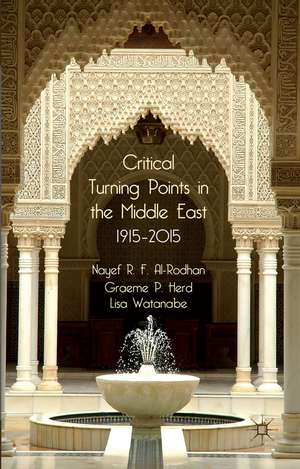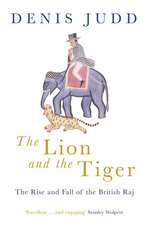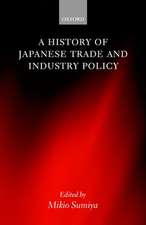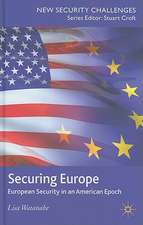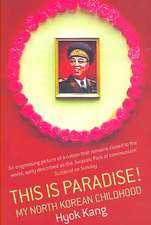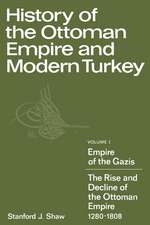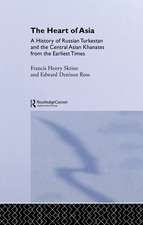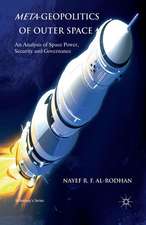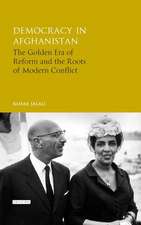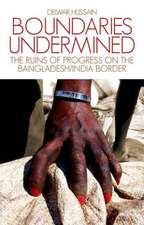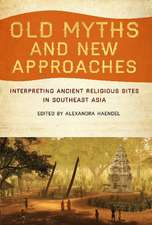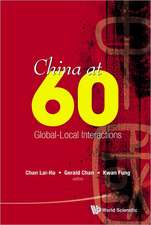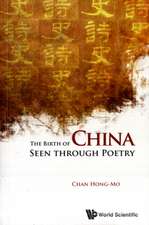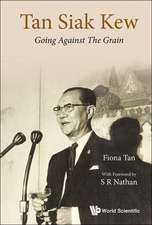Critical Turning Points in the Middle East: 1915 - 2015
Autor N. Al-Rodhan, G. Herd, L. Watanabeen Limba Engleză Paperback – 28 apr 2011
| Toate formatele și edițiile | Preț | Express |
|---|---|---|
| Paperback (2) | 189.68 lei 2 zile | |
| Palgrave Macmillan UK – 28 apr 2011 | 189.68 lei 2 zile | |
| Palgrave Macmillan UK – 2011 | 386.22 lei 43-57 zile | |
| Hardback (1) | 392.60 lei 43-57 zile | |
| Palgrave Macmillan UK – 28 apr 2011 | 392.60 lei 43-57 zile |
Preț: 189.68 lei
Nou
Puncte Express: 285
Preț estimativ în valută:
36.30€ • 37.99$ • 30.21£
36.30€ • 37.99$ • 30.21£
Carte în stoc
Livrare din stoc 18 februarie
Preluare comenzi: 021 569.72.76
Specificații
ISBN-13: 9781137311917
ISBN-10: 1137311916
Pagini: 261
Ilustrații: XV, 256 p.
Dimensiuni: 140 x 216 x 18 mm
Greutate: 0.39 kg
Ediția:2011
Editura: Palgrave Macmillan UK
Colecția Palgrave Macmillan
Locul publicării:London, United Kingdom
ISBN-10: 1137311916
Pagini: 261
Ilustrații: XV, 256 p.
Dimensiuni: 140 x 216 x 18 mm
Greutate: 0.39 kg
Ediția:2011
Editura: Palgrave Macmillan UK
Colecția Palgrave Macmillan
Locul publicării:London, United Kingdom
Cuprins
Introduction The Historical Legacy – The Rise and Fall of the Golden Era The First Critical Turning Point – 1915-22 The Second Critical Turning Point – 1948 The Third Critical Turning Point – 1967 The Fourth Critical Turning Point – 1979 The Fifth Critical Turning Point – 1987-91 The Sixth Critical Turning Point – 2001 Implications for a Potential Critical Seventh Turning Point – 2011-15 Afterword
Recenzii
"This is a thoughtful and thought-provoking study that makes evident the history behind the current situation. The study concludes with a set of recommendations designed to promote stability and security."
- Book News Inc: Reference and Research Book News
"This book offers a unique way of looking at the events that have transpired in the Middle East over the past century. Interpreting events through the prism of good governance and dignity deficits offers the reader a chance to see how the same moment in time can be viewed by different audiences with sometimes tragic consequences. The authors' ability to use these past events as a way to shape future policies in and toward the region are most insightful."
- Roger Kangas, Washington D.C., USA.
"[This book] provide a remarkably balanced and insightful picture of the forces that have driven the Arab world over the past Century. Unlike so many other studies, it explains events from an Arab perspective [...] and the critical impact of the Arab-Israeli conflict without choosing sides. The final section on "dignity deficits" makes it clear that the fact the underlying forces involved are not driven by problem in Islam or by some "clash between civilizations," and provides realistic and balanced priorities for dealing with problems that the Arab world must now solve to move forward."
- Anthony H. Cordesman, Washington D.C., USA
"At long last a book on the Middle East which is free from the usual Western stereotypes of Arabs and Muslims [...] The result is a thoughtful and thought-provoking book on an eventual century in Middle Eastern history."
Avi Shlaim, University of Oxford, UK
- Book News Inc: Reference and Research Book News
"This book offers a unique way of looking at the events that have transpired in the Middle East over the past century. Interpreting events through the prism of good governance and dignity deficits offers the reader a chance to see how the same moment in time can be viewed by different audiences with sometimes tragic consequences. The authors' ability to use these past events as a way to shape future policies in and toward the region are most insightful."
- Roger Kangas, Washington D.C., USA.
"[This book] provide a remarkably balanced and insightful picture of the forces that have driven the Arab world over the past Century. Unlike so many other studies, it explains events from an Arab perspective [...] and the critical impact of the Arab-Israeli conflict without choosing sides. The final section on "dignity deficits" makes it clear that the fact the underlying forces involved are not driven by problem in Islam or by some "clash between civilizations," and provides realistic and balanced priorities for dealing with problems that the Arab world must now solve to move forward."
- Anthony H. Cordesman, Washington D.C., USA
"At long last a book on the Middle East which is free from the usual Western stereotypes of Arabs and Muslims [...] The result is a thoughtful and thought-provoking book on an eventual century in Middle Eastern history."
Avi Shlaim, University of Oxford, UK
Notă biografică
Dr. Nayef R.F.Al-Rodhan is Senior Member of St. Antony's College, University of Oxford, UK, and Senior Fellow and Director of the Centre for the Geopolitics of Globalisation and Transnational Security at the Geneva Centre for Security Policy, Switzerland. He is a philosopher, neuroscientist and geostrategist. A prize-winning scholar, he has published twenty one books proposing many innovative concepts and theories in global politics, security, philosophy and history. He was educated at Yale University, the Mayo Clinic and Harvard University. He is best known for several philosophical and analytic books on global politics that include: The Role of the Arab-Islamic World in the Rise of the West (Palgrave, 2012); Sustainable History and the Dignity of Man; Emotional Amoral Egoism; Neo-Statecraft and Meta-Geopolitics; The Politics of Emerging Strategic Technologies (Palgrave, 2011); and Symbiotic Realism.
